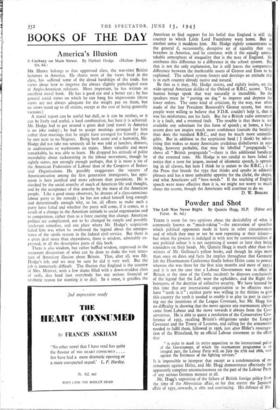BOOKS OF THE DAY
America's Illusion
MR. HODGE belongs to that oppressed class, the war-time British lecturers in America. He shares most of the views bred in the class, has suffered some of the dread hardships of the trade, has s iews about how to improve the always slightly pathological state of Anglo-American relations. More important, he has written an excellent travel book. He has a good eye and a better ear ; he has general social views on which he can hang his impressions (those views are not always adequate for the weight put on them, but no views stand up to all strains, except at the cost of being generally vacuous.)
A travel report can be useful but dull, or it can be neither, or it can be lively and useful, a hard combination, but here it is achieved. Mr. Hodge had to get around a great deal (and travel in America is no joke today) ; he had to accept meetings arranged for him rather than meetings that he might have arranged for himself ; thus he met next to no Negroes. Being both acute and a humorist, Mr. Hodge did not take too seriously all he was told at lunches, dinners, in auditoriums or washrooms on trains. More valuable and more remarkable, he was able to learn. He dropped his attitude of polite incredulity about racketeering in the labour movement, though he rightly states, not strongly enough perhaps, that it is more a sin of the American Federation of Labour than of the Congress of Indus- trial Organisations. He possibly exaggerates the success of Americanisation among the first generation immigrants, but opti- mism is here justified and more relevant than pessimism. He is shocked by the social anarchy of much of American life and thought, and by the acceptance of that anarchy by the mass of the American people." Like a good many observers, he dreams of a class-conscious labour party as the remedy ; he has not asked himself long enough and determinedly enough why, so far, all efforts to make such a party have failed and whether the party will come, if it comes, as a result of a change in the American attitude to social organisation and to competition, rather than as a force causing that change. American politics are complicated, not to b.: changed by simple and possibly irrelevant remedies, and one place where Mr. Hodge's scepticism failed him was when he swallowed the legend about the omnipo- tence of the spoils system in the federal civil service. But there is a great deal more than shrewdness, there is -wisdom, admirably ex- pressed, in all the descriptive parts of this book. There is also wisdom, but rather baffled wisdom, expressed in the recurrent discussions of what can be done to shake the vast struc- ture of American illusion about Britain. That, after all, was Mr. Hodge's job, and we may be sure he did it very well. But the job is immensely difficult. The illusion that England is the country of Mrs. Miniver, with a few slums filled with a down-trodden class of serfs, dies hard (not everybody has any serious financial or aesthetic reason for wanting it to die). In a sense, it gratifies the American to find support for his belief that England is still the country to which Little Lord Fauntleroy went home. But in another sense it maddens him. Mr. Hodge rightly concentrates on the general if, occasionally, deceptive air of equality that one breathes in America, and he contrasts with it the equally unmis- takable atmosphere of inequality that is the note of England. He attributes this difference to a difference in the school system. But that is not the only explanation, for it still leaves the comparative difference between the marketable assets of Groton and Eton to be explained. The school system fosters and develops an attitude that is in each country already native and natural.
Be that as it may, Mr. Hodge insists and rightly insists, on the wide-spread American dislike of the Oxford or B.B.C. accent. That human beings speak that way naturally is incredible. So the speakers must be "putting on dog" to impress and depress the lower orders. The same kind of criticism, by the way, was often made of the late President Roosevelt's Groton accent, but most people were willing to believe that F.D.R. couldn't help it, that it was his misfortune, not his fault. But for a British radio announcer it is a fault, and a resented fault. The trouble is that there is not available any substitute for this form of speech ; at home, a local accent does not inspire much more confidence (outside the locality) than does the standard B.B.C., and may be much more unintelli- gible. But in addition to the scepticism bred ( I think) by adver- tising that makes so many Americans credulous disbelievers in any- thing, however probable, that may be labelled "propaganda "— above all "British propaganda "—there is this additional handicap of the resented tone. Mr. Hodge is too candid to have failed, to notice that a taste for jargon, instead of idiomatic speech, is spread- ing in all classes, but here I think he is unjust to the B.B.C.; it is the Press that breeds the type that thinks and speaks in editorial phrases and has a most unhealthy appetite for the cliché the slogan, and what Americans call "boss words." If the teaching of English speech were more effective than it is, we might not worry so much about the accent, though the Americans will continue to do so.
D. W. BROGAN.


























 Previous page
Previous page